Comprehensive Business Environment Analysis for Iceland Supermarket
VerifiedAdded on 2020/01/28
|19
|6226
|382
Report
AI Summary
This report provides a comprehensive analysis of the business environment surrounding Iceland Supermarket. It begins with an introduction to the concept of the business environment and its importance. The report then delves into the organizational purpose of Iceland Supermarket, comparing it with other organizations like KFC, Transport for London, and Cancer Research. It explores how Iceland Supermarket meets the objectives of its stakeholders, including employees, consumers, suppliers, and the government, and details the company's responsibilities and strategies to fulfill stakeholder expectations. The report examines different economic systems and their impact on resource allocation, focusing on free market, transitional, command, and mixed economies, with specific examples related to Iceland Supermarket. It analyzes the effects of fiscal and monetary policies on the company's operations and evaluates the impact of competition policy and other regulatory mechanisms. Furthermore, the report investigates market structures influencing pricing and output decisions, market forces shaping Iceland Supermarket's responses, and the impact of the business and cultural environment on its behavior. It concludes by assessing the significance of international trade, global factors, and the policies of the European Union on Iceland Supermarket's activities.
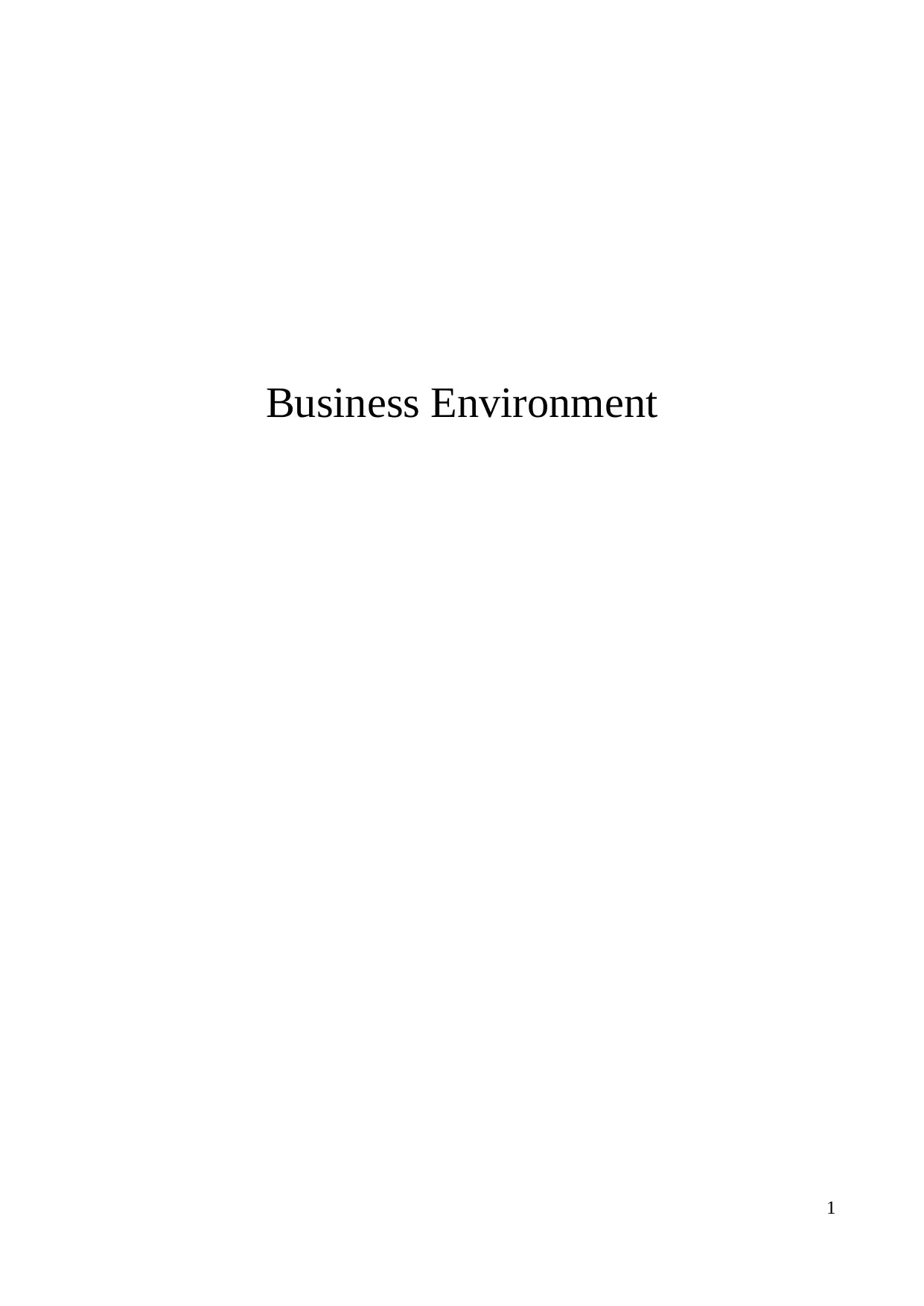
Business Environment
1
1
Paraphrase This Document
Need a fresh take? Get an instant paraphrase of this document with our AI Paraphraser
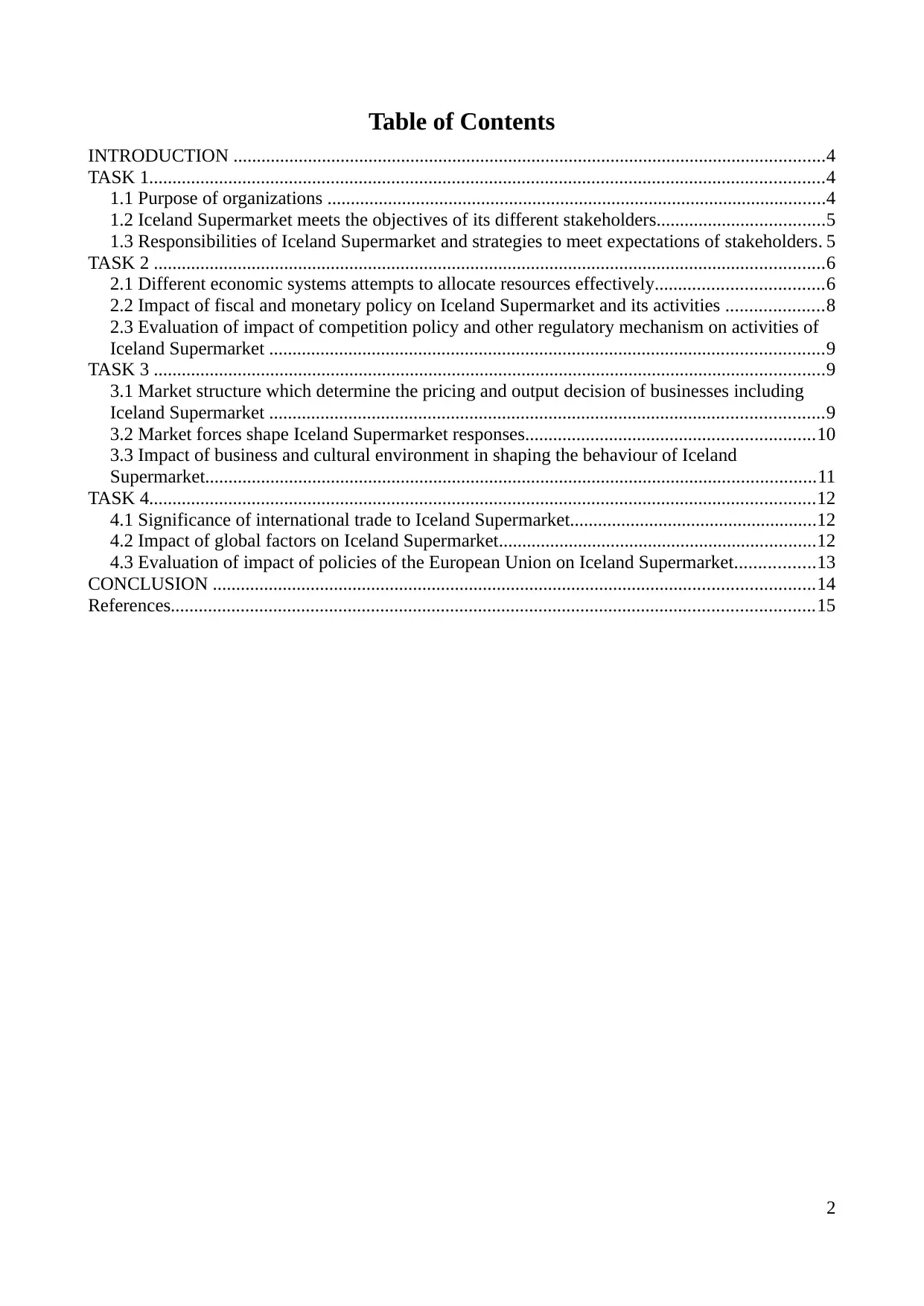
Table of Contents
INTRODUCTION ...............................................................................................................................4
TASK 1.................................................................................................................................................4
1.1 Purpose of organizations ...........................................................................................................4
1.2 Iceland Supermarket meets the objectives of its different stakeholders....................................5
1.3 Responsibilities of Iceland Supermarket and strategies to meet expectations of stakeholders. 5
TASK 2 ................................................................................................................................................6
2.1 Different economic systems attempts to allocate resources effectively....................................6
2.2 Impact of fiscal and monetary policy on Iceland Supermarket and its activities .....................8
2.3 Evaluation of impact of competition policy and other regulatory mechanism on activities of
Iceland Supermarket .......................................................................................................................9
TASK 3 ................................................................................................................................................9
3.1 Market structure which determine the pricing and output decision of businesses including
Iceland Supermarket .......................................................................................................................9
3.2 Market forces shape Iceland Supermarket responses..............................................................10
3.3 Impact of business and cultural environment in shaping the behaviour of Iceland
Supermarket...................................................................................................................................11
TASK 4...............................................................................................................................................12
4.1 Significance of international trade to Iceland Supermarket.....................................................12
4.2 Impact of global factors on Iceland Supermarket....................................................................12
4.3 Evaluation of impact of policies of the European Union on Iceland Supermarket.................13
CONCLUSION .................................................................................................................................14
References..........................................................................................................................................15
2
INTRODUCTION ...............................................................................................................................4
TASK 1.................................................................................................................................................4
1.1 Purpose of organizations ...........................................................................................................4
1.2 Iceland Supermarket meets the objectives of its different stakeholders....................................5
1.3 Responsibilities of Iceland Supermarket and strategies to meet expectations of stakeholders. 5
TASK 2 ................................................................................................................................................6
2.1 Different economic systems attempts to allocate resources effectively....................................6
2.2 Impact of fiscal and monetary policy on Iceland Supermarket and its activities .....................8
2.3 Evaluation of impact of competition policy and other regulatory mechanism on activities of
Iceland Supermarket .......................................................................................................................9
TASK 3 ................................................................................................................................................9
3.1 Market structure which determine the pricing and output decision of businesses including
Iceland Supermarket .......................................................................................................................9
3.2 Market forces shape Iceland Supermarket responses..............................................................10
3.3 Impact of business and cultural environment in shaping the behaviour of Iceland
Supermarket...................................................................................................................................11
TASK 4...............................................................................................................................................12
4.1 Significance of international trade to Iceland Supermarket.....................................................12
4.2 Impact of global factors on Iceland Supermarket....................................................................12
4.3 Evaluation of impact of policies of the European Union on Iceland Supermarket.................13
CONCLUSION .................................................................................................................................14
References..........................................................................................................................................15
2
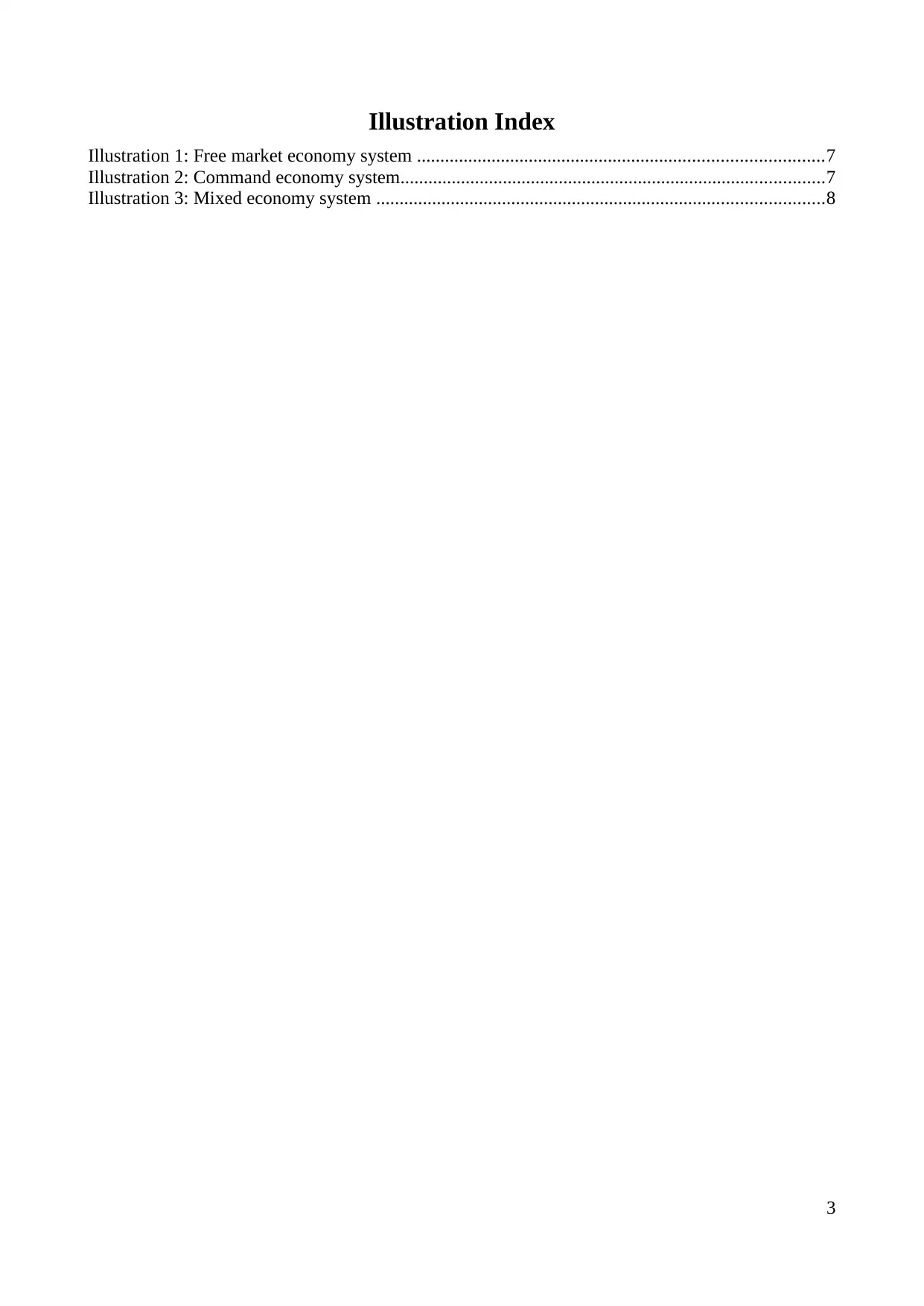
Illustration Index
Illustration 1: Free market economy system .......................................................................................7
Illustration 2: Command economy system...........................................................................................7
Illustration 3: Mixed economy system ................................................................................................8
3
Illustration 1: Free market economy system .......................................................................................7
Illustration 2: Command economy system...........................................................................................7
Illustration 3: Mixed economy system ................................................................................................8
3
⊘ This is a preview!⊘
Do you want full access?
Subscribe today to unlock all pages.

Trusted by 1+ million students worldwide
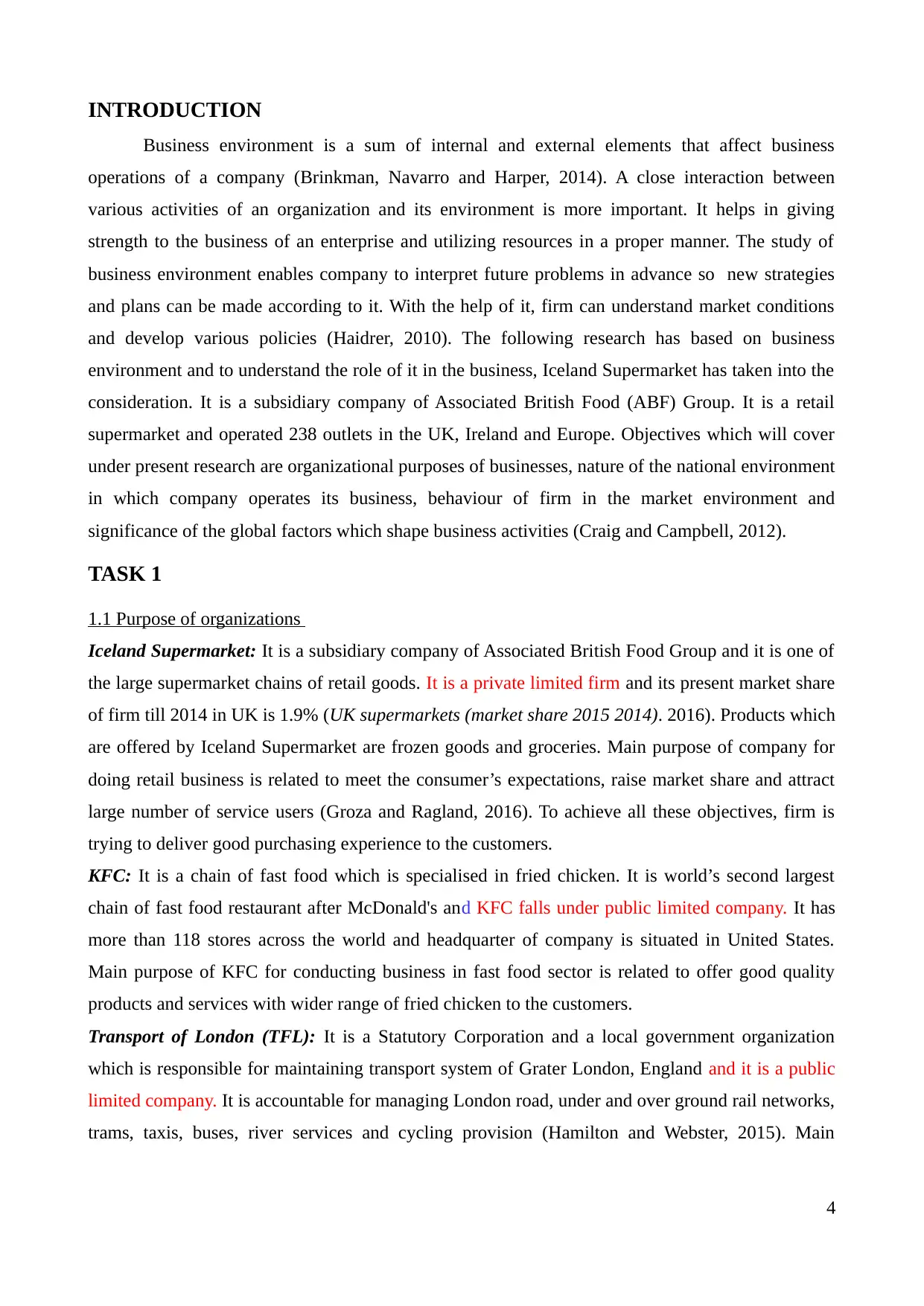
INTRODUCTION
Business environment is a sum of internal and external elements that affect business
operations of a company (Brinkman, Navarro and Harper, 2014). A close interaction between
various activities of an organization and its environment is more important. It helps in giving
strength to the business of an enterprise and utilizing resources in a proper manner. The study of
business environment enables company to interpret future problems in advance so new strategies
and plans can be made according to it. With the help of it, firm can understand market conditions
and develop various policies (Haidrer, 2010). The following research has based on business
environment and to understand the role of it in the business, Iceland Supermarket has taken into the
consideration. It is a subsidiary company of Associated British Food (ABF) Group. It is a retail
supermarket and operated 238 outlets in the UK, Ireland and Europe. Objectives which will cover
under present research are organizational purposes of businesses, nature of the national environment
in which company operates its business, behaviour of firm in the market environment and
significance of the global factors which shape business activities (Craig and Campbell, 2012).
TASK 1
1.1 Purpose of organizations
Iceland Supermarket: It is a subsidiary company of Associated British Food Group and it is one of
the large supermarket chains of retail goods. It is a private limited firm and its present market share
of firm till 2014 in UK is 1.9% (UK supermarkets (market share 2015 2014). 2016). Products which
are offered by Iceland Supermarket are frozen goods and groceries. Main purpose of company for
doing retail business is related to meet the consumer’s expectations, raise market share and attract
large number of service users (Groza and Ragland, 2016). To achieve all these objectives, firm is
trying to deliver good purchasing experience to the customers.
KFC: It is a chain of fast food which is specialised in fried chicken. It is world’s second largest
chain of fast food restaurant after McDonald's and KFC falls under public limited company. It has
more than 118 stores across the world and headquarter of company is situated in United States.
Main purpose of KFC for conducting business in fast food sector is related to offer good quality
products and services with wider range of fried chicken to the customers.
Transport of London (TFL): It is a Statutory Corporation and a local government organization
which is responsible for maintaining transport system of Grater London, England and it is a public
limited company. It is accountable for managing London road, under and over ground rail networks,
trams, taxis, buses, river services and cycling provision (Hamilton and Webster, 2015). Main
4
Business environment is a sum of internal and external elements that affect business
operations of a company (Brinkman, Navarro and Harper, 2014). A close interaction between
various activities of an organization and its environment is more important. It helps in giving
strength to the business of an enterprise and utilizing resources in a proper manner. The study of
business environment enables company to interpret future problems in advance so new strategies
and plans can be made according to it. With the help of it, firm can understand market conditions
and develop various policies (Haidrer, 2010). The following research has based on business
environment and to understand the role of it in the business, Iceland Supermarket has taken into the
consideration. It is a subsidiary company of Associated British Food (ABF) Group. It is a retail
supermarket and operated 238 outlets in the UK, Ireland and Europe. Objectives which will cover
under present research are organizational purposes of businesses, nature of the national environment
in which company operates its business, behaviour of firm in the market environment and
significance of the global factors which shape business activities (Craig and Campbell, 2012).
TASK 1
1.1 Purpose of organizations
Iceland Supermarket: It is a subsidiary company of Associated British Food Group and it is one of
the large supermarket chains of retail goods. It is a private limited firm and its present market share
of firm till 2014 in UK is 1.9% (UK supermarkets (market share 2015 2014). 2016). Products which
are offered by Iceland Supermarket are frozen goods and groceries. Main purpose of company for
doing retail business is related to meet the consumer’s expectations, raise market share and attract
large number of service users (Groza and Ragland, 2016). To achieve all these objectives, firm is
trying to deliver good purchasing experience to the customers.
KFC: It is a chain of fast food which is specialised in fried chicken. It is world’s second largest
chain of fast food restaurant after McDonald's and KFC falls under public limited company. It has
more than 118 stores across the world and headquarter of company is situated in United States.
Main purpose of KFC for conducting business in fast food sector is related to offer good quality
products and services with wider range of fried chicken to the customers.
Transport of London (TFL): It is a Statutory Corporation and a local government organization
which is responsible for maintaining transport system of Grater London, England and it is a public
limited company. It is accountable for managing London road, under and over ground rail networks,
trams, taxis, buses, river services and cycling provision (Hamilton and Webster, 2015). Main
4
Paraphrase This Document
Need a fresh take? Get an instant paraphrase of this document with our AI Paraphraser
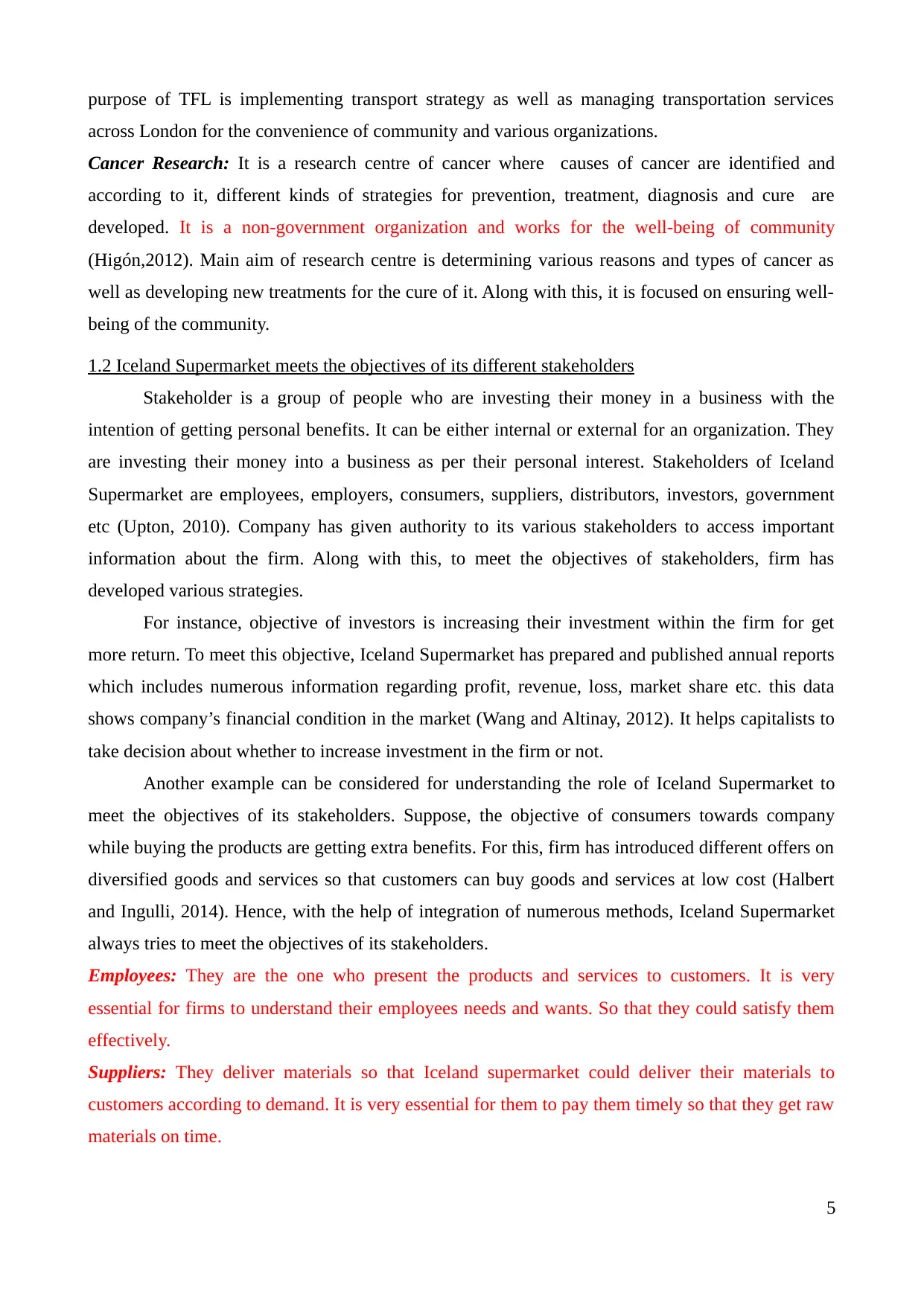
purpose of TFL is implementing transport strategy as well as managing transportation services
across London for the convenience of community and various organizations.
Cancer Research: It is a research centre of cancer where causes of cancer are identified and
according to it, different kinds of strategies for prevention, treatment, diagnosis and cure are
developed. It is a non-government organization and works for the well-being of community
(Higón,2012). Main aim of research centre is determining various reasons and types of cancer as
well as developing new treatments for the cure of it. Along with this, it is focused on ensuring well-
being of the community.
1.2 Iceland Supermarket meets the objectives of its different stakeholders
Stakeholder is a group of people who are investing their money in a business with the
intention of getting personal benefits. It can be either internal or external for an organization. They
are investing their money into a business as per their personal interest. Stakeholders of Iceland
Supermarket are employees, employers, consumers, suppliers, distributors, investors, government
etc (Upton, 2010). Company has given authority to its various stakeholders to access important
information about the firm. Along with this, to meet the objectives of stakeholders, firm has
developed various strategies.
For instance, objective of investors is increasing their investment within the firm for get
more return. To meet this objective, Iceland Supermarket has prepared and published annual reports
which includes numerous information regarding profit, revenue, loss, market share etc. this data
shows company’s financial condition in the market (Wang and Altinay, 2012). It helps capitalists to
take decision about whether to increase investment in the firm or not.
Another example can be considered for understanding the role of Iceland Supermarket to
meet the objectives of its stakeholders. Suppose, the objective of consumers towards company
while buying the products are getting extra benefits. For this, firm has introduced different offers on
diversified goods and services so that customers can buy goods and services at low cost (Halbert
and Ingulli, 2014). Hence, with the help of integration of numerous methods, Iceland Supermarket
always tries to meet the objectives of its stakeholders.
Employees: They are the one who present the products and services to customers. It is very
essential for firms to understand their employees needs and wants. So that they could satisfy them
effectively.
Suppliers: They deliver materials so that Iceland supermarket could deliver their materials to
customers according to demand. It is very essential for them to pay them timely so that they get raw
materials on time.
5
across London for the convenience of community and various organizations.
Cancer Research: It is a research centre of cancer where causes of cancer are identified and
according to it, different kinds of strategies for prevention, treatment, diagnosis and cure are
developed. It is a non-government organization and works for the well-being of community
(Higón,2012). Main aim of research centre is determining various reasons and types of cancer as
well as developing new treatments for the cure of it. Along with this, it is focused on ensuring well-
being of the community.
1.2 Iceland Supermarket meets the objectives of its different stakeholders
Stakeholder is a group of people who are investing their money in a business with the
intention of getting personal benefits. It can be either internal or external for an organization. They
are investing their money into a business as per their personal interest. Stakeholders of Iceland
Supermarket are employees, employers, consumers, suppliers, distributors, investors, government
etc (Upton, 2010). Company has given authority to its various stakeholders to access important
information about the firm. Along with this, to meet the objectives of stakeholders, firm has
developed various strategies.
For instance, objective of investors is increasing their investment within the firm for get
more return. To meet this objective, Iceland Supermarket has prepared and published annual reports
which includes numerous information regarding profit, revenue, loss, market share etc. this data
shows company’s financial condition in the market (Wang and Altinay, 2012). It helps capitalists to
take decision about whether to increase investment in the firm or not.
Another example can be considered for understanding the role of Iceland Supermarket to
meet the objectives of its stakeholders. Suppose, the objective of consumers towards company
while buying the products are getting extra benefits. For this, firm has introduced different offers on
diversified goods and services so that customers can buy goods and services at low cost (Halbert
and Ingulli, 2014). Hence, with the help of integration of numerous methods, Iceland Supermarket
always tries to meet the objectives of its stakeholders.
Employees: They are the one who present the products and services to customers. It is very
essential for firms to understand their employees needs and wants. So that they could satisfy them
effectively.
Suppliers: They deliver materials so that Iceland supermarket could deliver their materials to
customers according to demand. It is very essential for them to pay them timely so that they get raw
materials on time.
5
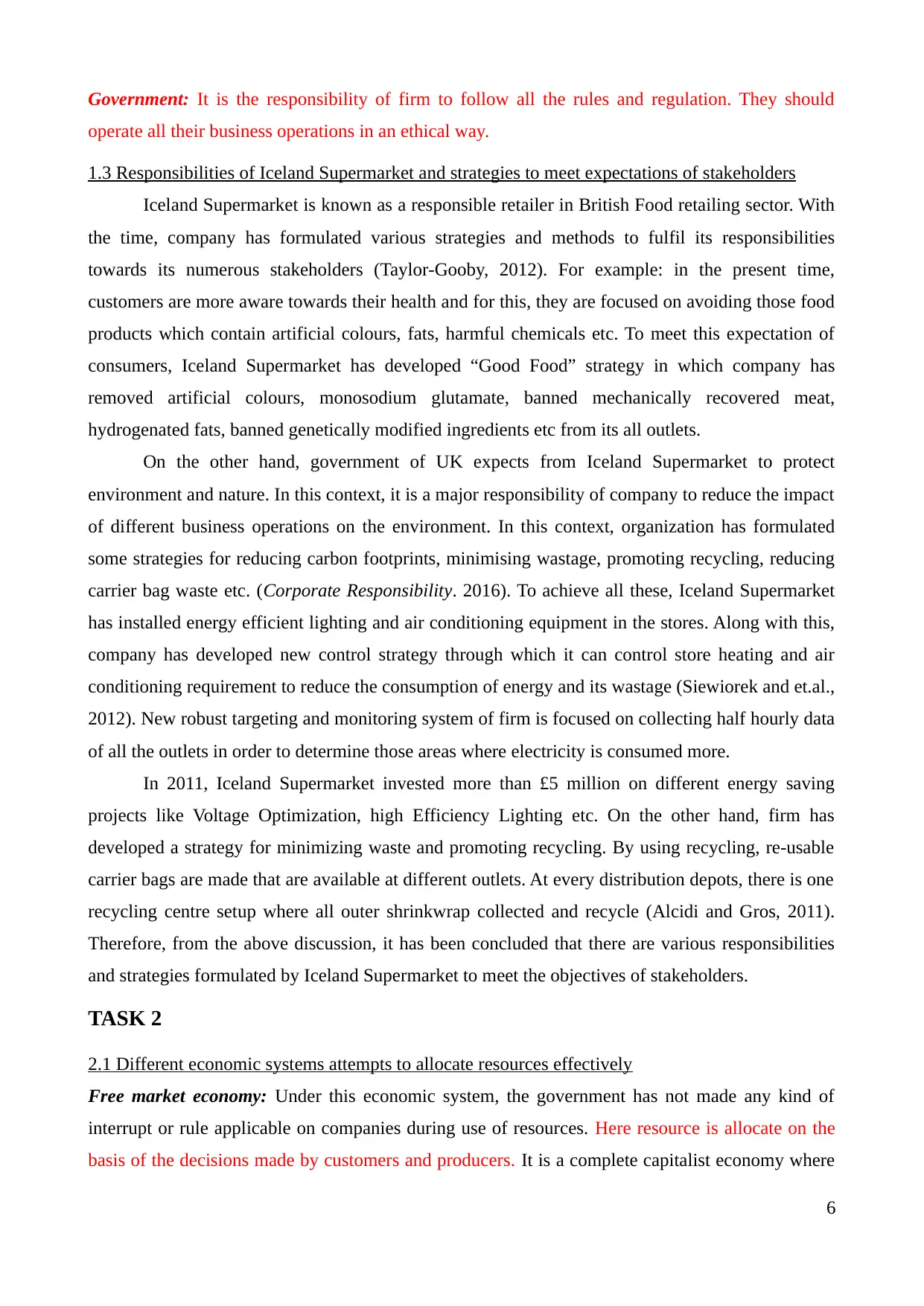
Government: It is the responsibility of firm to follow all the rules and regulation. They should
operate all their business operations in an ethical way.
1.3 Responsibilities of Iceland Supermarket and strategies to meet expectations of stakeholders
Iceland Supermarket is known as a responsible retailer in British Food retailing sector. With
the time, company has formulated various strategies and methods to fulfil its responsibilities
towards its numerous stakeholders (Taylor‐Gooby, 2012). For example: in the present time,
customers are more aware towards their health and for this, they are focused on avoiding those food
products which contain artificial colours, fats, harmful chemicals etc. To meet this expectation of
consumers, Iceland Supermarket has developed “Good Food” strategy in which company has
removed artificial colours, monosodium glutamate, banned mechanically recovered meat,
hydrogenated fats, banned genetically modified ingredients etc from its all outlets.
On the other hand, government of UK expects from Iceland Supermarket to protect
environment and nature. In this context, it is a major responsibility of company to reduce the impact
of different business operations on the environment. In this context, organization has formulated
some strategies for reducing carbon footprints, minimising wastage, promoting recycling, reducing
carrier bag waste etc. (Corporate Responsibility. 2016). To achieve all these, Iceland Supermarket
has installed energy efficient lighting and air conditioning equipment in the stores. Along with this,
company has developed new control strategy through which it can control store heating and air
conditioning requirement to reduce the consumption of energy and its wastage (Siewiorek and et.al.,
2012). New robust targeting and monitoring system of firm is focused on collecting half hourly data
of all the outlets in order to determine those areas where electricity is consumed more.
In 2011, Iceland Supermarket invested more than £5 million on different energy saving
projects like Voltage Optimization, high Efficiency Lighting etc. On the other hand, firm has
developed a strategy for minimizing waste and promoting recycling. By using recycling, re-usable
carrier bags are made that are available at different outlets. At every distribution depots, there is one
recycling centre setup where all outer shrinkwrap collected and recycle (Alcidi and Gros, 2011).
Therefore, from the above discussion, it has been concluded that there are various responsibilities
and strategies formulated by Iceland Supermarket to meet the objectives of stakeholders.
TASK 2
2.1 Different economic systems attempts to allocate resources effectively
Free market economy: Under this economic system, the government has not made any kind of
interrupt or rule applicable on companies during use of resources. Here resource is allocate on the
basis of the decisions made by customers and producers. It is a complete capitalist economy where
6
operate all their business operations in an ethical way.
1.3 Responsibilities of Iceland Supermarket and strategies to meet expectations of stakeholders
Iceland Supermarket is known as a responsible retailer in British Food retailing sector. With
the time, company has formulated various strategies and methods to fulfil its responsibilities
towards its numerous stakeholders (Taylor‐Gooby, 2012). For example: in the present time,
customers are more aware towards their health and for this, they are focused on avoiding those food
products which contain artificial colours, fats, harmful chemicals etc. To meet this expectation of
consumers, Iceland Supermarket has developed “Good Food” strategy in which company has
removed artificial colours, monosodium glutamate, banned mechanically recovered meat,
hydrogenated fats, banned genetically modified ingredients etc from its all outlets.
On the other hand, government of UK expects from Iceland Supermarket to protect
environment and nature. In this context, it is a major responsibility of company to reduce the impact
of different business operations on the environment. In this context, organization has formulated
some strategies for reducing carbon footprints, minimising wastage, promoting recycling, reducing
carrier bag waste etc. (Corporate Responsibility. 2016). To achieve all these, Iceland Supermarket
has installed energy efficient lighting and air conditioning equipment in the stores. Along with this,
company has developed new control strategy through which it can control store heating and air
conditioning requirement to reduce the consumption of energy and its wastage (Siewiorek and et.al.,
2012). New robust targeting and monitoring system of firm is focused on collecting half hourly data
of all the outlets in order to determine those areas where electricity is consumed more.
In 2011, Iceland Supermarket invested more than £5 million on different energy saving
projects like Voltage Optimization, high Efficiency Lighting etc. On the other hand, firm has
developed a strategy for minimizing waste and promoting recycling. By using recycling, re-usable
carrier bags are made that are available at different outlets. At every distribution depots, there is one
recycling centre setup where all outer shrinkwrap collected and recycle (Alcidi and Gros, 2011).
Therefore, from the above discussion, it has been concluded that there are various responsibilities
and strategies formulated by Iceland Supermarket to meet the objectives of stakeholders.
TASK 2
2.1 Different economic systems attempts to allocate resources effectively
Free market economy: Under this economic system, the government has not made any kind of
interrupt or rule applicable on companies during use of resources. Here resource is allocate on the
basis of the decisions made by customers and producers. It is a complete capitalist economy where
6
⊘ This is a preview!⊘
Do you want full access?
Subscribe today to unlock all pages.

Trusted by 1+ million students worldwide
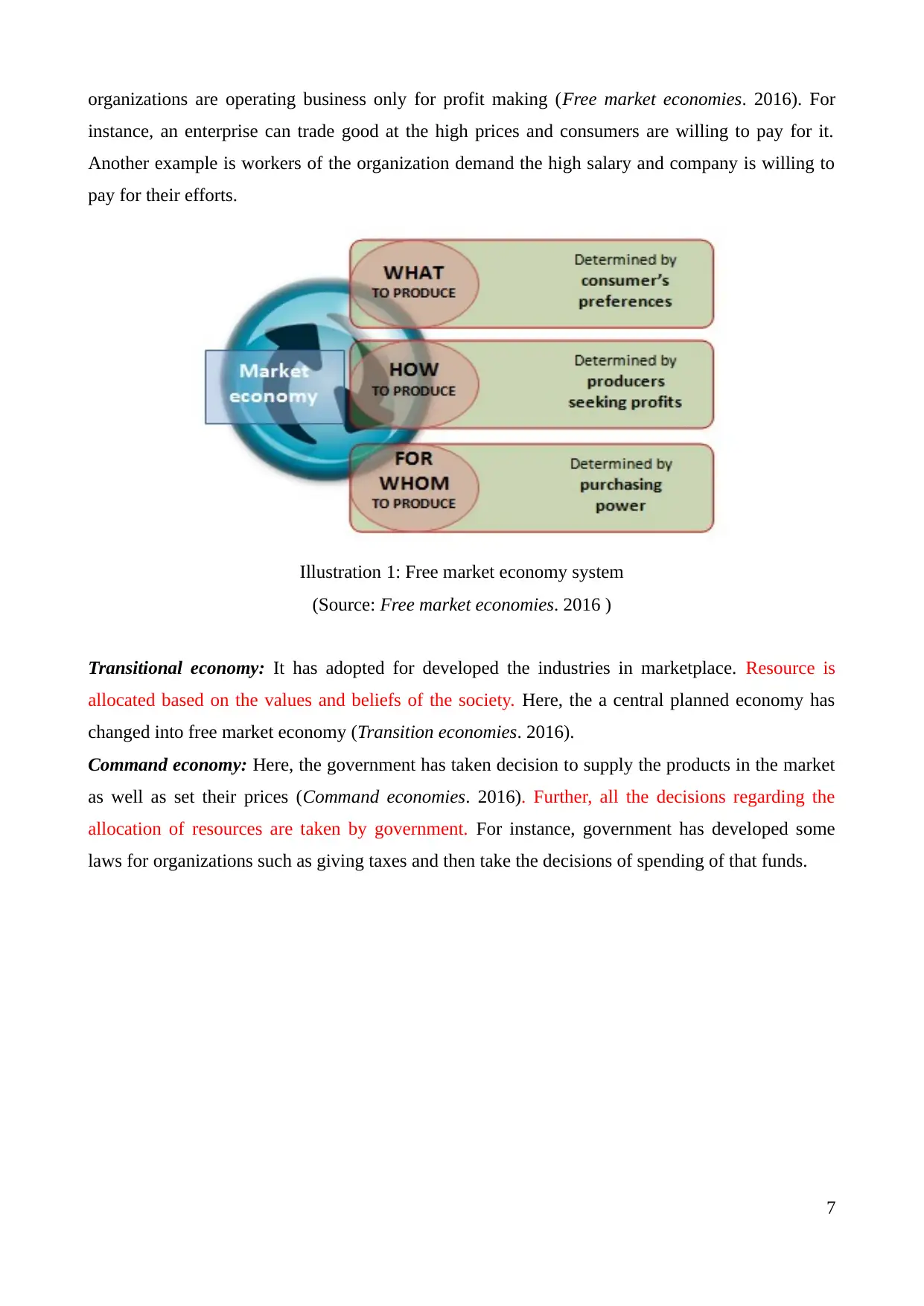
organizations are operating business only for profit making (Free market economies. 2016). For
instance, an enterprise can trade good at the high prices and consumers are willing to pay for it.
Another example is workers of the organization demand the high salary and company is willing to
pay for their efforts.
Transitional economy: It has adopted for developed the industries in marketplace. Resource is
allocated based on the values and beliefs of the society. Here, the a central planned economy has
changed into free market economy (Transition economies. 2016).
Command economy: Here, the government has taken decision to supply the products in the market
as well as set their prices (Command economies. 2016). Further, all the decisions regarding the
allocation of resources are taken by government. For instance, government has developed some
laws for organizations such as giving taxes and then take the decisions of spending of that funds.
7
Illustration 1: Free market economy system
(Source: Free market economies. 2016 )
instance, an enterprise can trade good at the high prices and consumers are willing to pay for it.
Another example is workers of the organization demand the high salary and company is willing to
pay for their efforts.
Transitional economy: It has adopted for developed the industries in marketplace. Resource is
allocated based on the values and beliefs of the society. Here, the a central planned economy has
changed into free market economy (Transition economies. 2016).
Command economy: Here, the government has taken decision to supply the products in the market
as well as set their prices (Command economies. 2016). Further, all the decisions regarding the
allocation of resources are taken by government. For instance, government has developed some
laws for organizations such as giving taxes and then take the decisions of spending of that funds.
7
Illustration 1: Free market economy system
(Source: Free market economies. 2016 )
Paraphrase This Document
Need a fresh take? Get an instant paraphrase of this document with our AI Paraphraser
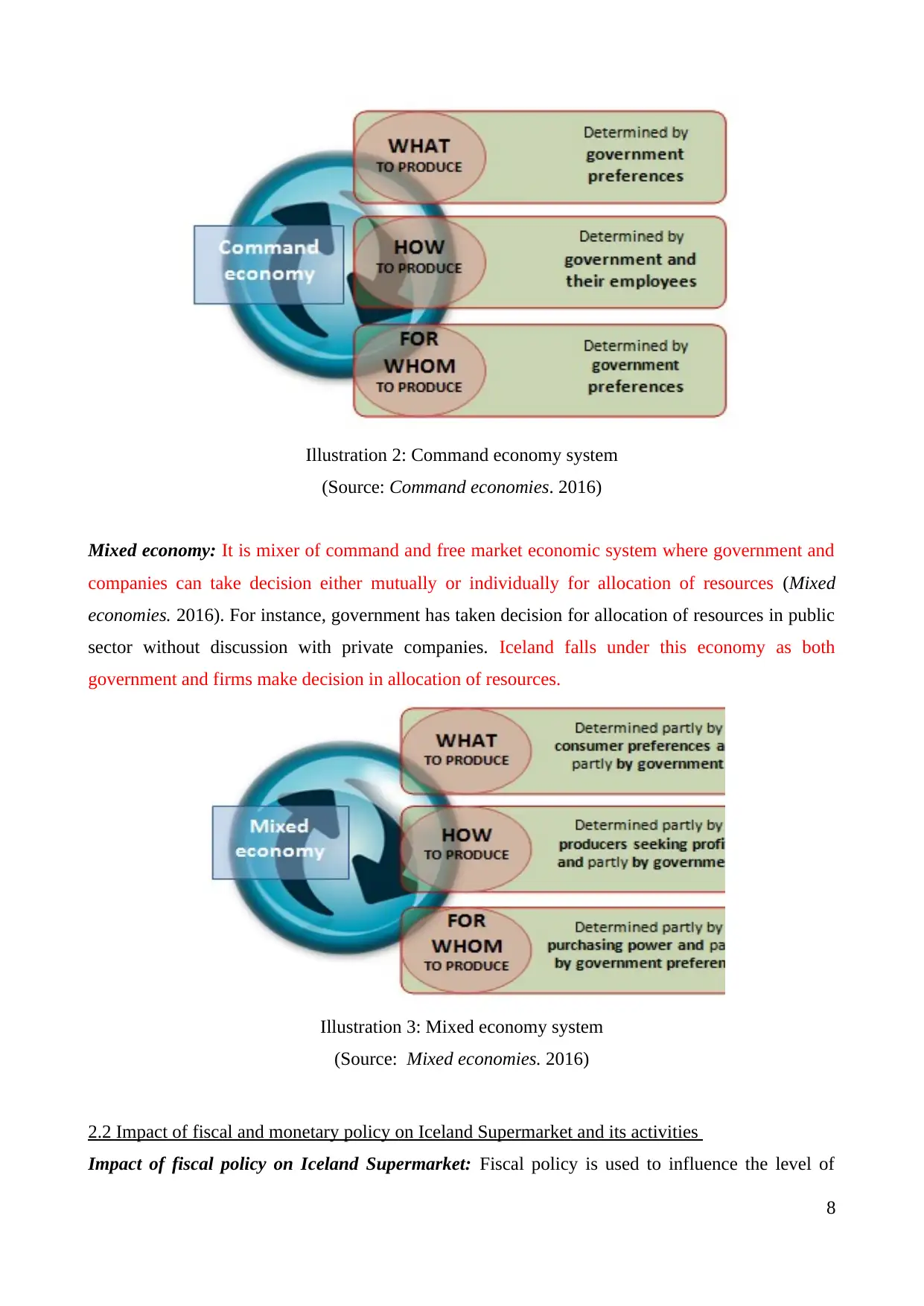
Mixed economy: It is mixer of command and free market economic system where government and
companies can take decision either mutually or individually for allocation of resources (Mixed
economies. 2016). For instance, government has taken decision for allocation of resources in public
sector without discussion with private companies. Iceland falls under this economy as both
government and firms make decision in allocation of resources.
2.2 Impact of fiscal and monetary policy on Iceland Supermarket and its activities
Impact of fiscal policy on Iceland Supermarket: Fiscal policy is used to influence the level of
8
Illustration 2: Command economy system
(Source: Command economies. 2016)
Illustration 3: Mixed economy system
(Source: Mixed economies. 2016)
companies can take decision either mutually or individually for allocation of resources (Mixed
economies. 2016). For instance, government has taken decision for allocation of resources in public
sector without discussion with private companies. Iceland falls under this economy as both
government and firms make decision in allocation of resources.
2.2 Impact of fiscal and monetary policy on Iceland Supermarket and its activities
Impact of fiscal policy on Iceland Supermarket: Fiscal policy is used to influence the level of
8
Illustration 2: Command economy system
(Source: Command economies. 2016)
Illustration 3: Mixed economy system
(Source: Mixed economies. 2016)
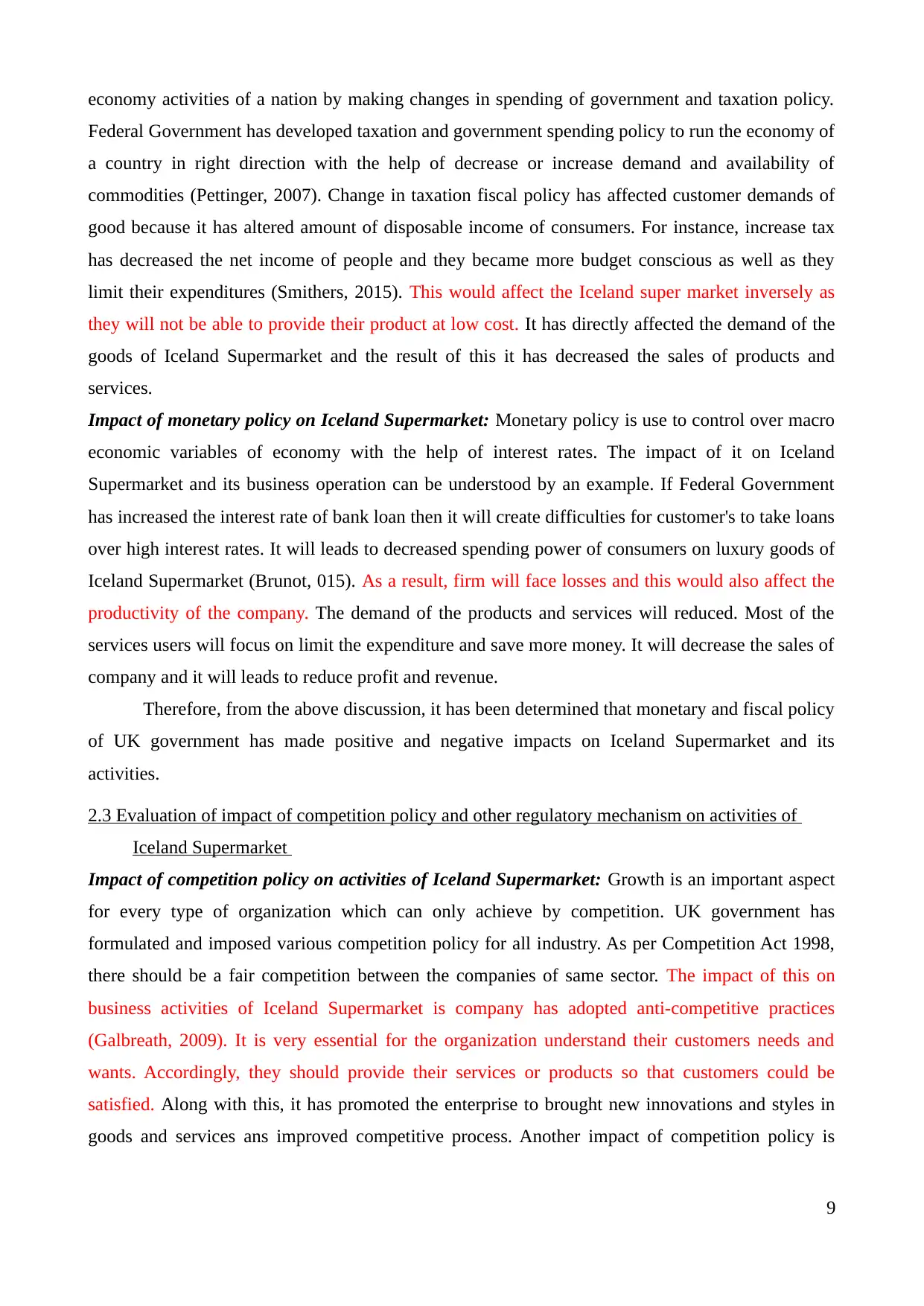
economy activities of a nation by making changes in spending of government and taxation policy.
Federal Government has developed taxation and government spending policy to run the economy of
a country in right direction with the help of decrease or increase demand and availability of
commodities (Pettinger, 2007). Change in taxation fiscal policy has affected customer demands of
good because it has altered amount of disposable income of consumers. For instance, increase tax
has decreased the net income of people and they became more budget conscious as well as they
limit their expenditures (Smithers, 2015). This would affect the Iceland super market inversely as
they will not be able to provide their product at low cost. It has directly affected the demand of the
goods of Iceland Supermarket and the result of this it has decreased the sales of products and
services.
Impact of monetary policy on Iceland Supermarket: Monetary policy is use to control over macro
economic variables of economy with the help of interest rates. The impact of it on Iceland
Supermarket and its business operation can be understood by an example. If Federal Government
has increased the interest rate of bank loan then it will create difficulties for customer's to take loans
over high interest rates. It will leads to decreased spending power of consumers on luxury goods of
Iceland Supermarket (Brunot, 015). As a result, firm will face losses and this would also affect the
productivity of the company. The demand of the products and services will reduced. Most of the
services users will focus on limit the expenditure and save more money. It will decrease the sales of
company and it will leads to reduce profit and revenue.
Therefore, from the above discussion, it has been determined that monetary and fiscal policy
of UK government has made positive and negative impacts on Iceland Supermarket and its
activities.
2.3 Evaluation of impact of competition policy and other regulatory mechanism on activities of
Iceland Supermarket
Impact of competition policy on activities of Iceland Supermarket: Growth is an important aspect
for every type of organization which can only achieve by competition. UK government has
formulated and imposed various competition policy for all industry. As per Competition Act 1998,
there should be a fair competition between the companies of same sector. The impact of this on
business activities of Iceland Supermarket is company has adopted anti-competitive practices
(Galbreath, 2009). It is very essential for the organization understand their customers needs and
wants. Accordingly, they should provide their services or products so that customers could be
satisfied. Along with this, it has promoted the enterprise to brought new innovations and styles in
goods and services ans improved competitive process. Another impact of competition policy is
9
Federal Government has developed taxation and government spending policy to run the economy of
a country in right direction with the help of decrease or increase demand and availability of
commodities (Pettinger, 2007). Change in taxation fiscal policy has affected customer demands of
good because it has altered amount of disposable income of consumers. For instance, increase tax
has decreased the net income of people and they became more budget conscious as well as they
limit their expenditures (Smithers, 2015). This would affect the Iceland super market inversely as
they will not be able to provide their product at low cost. It has directly affected the demand of the
goods of Iceland Supermarket and the result of this it has decreased the sales of products and
services.
Impact of monetary policy on Iceland Supermarket: Monetary policy is use to control over macro
economic variables of economy with the help of interest rates. The impact of it on Iceland
Supermarket and its business operation can be understood by an example. If Federal Government
has increased the interest rate of bank loan then it will create difficulties for customer's to take loans
over high interest rates. It will leads to decreased spending power of consumers on luxury goods of
Iceland Supermarket (Brunot, 015). As a result, firm will face losses and this would also affect the
productivity of the company. The demand of the products and services will reduced. Most of the
services users will focus on limit the expenditure and save more money. It will decrease the sales of
company and it will leads to reduce profit and revenue.
Therefore, from the above discussion, it has been determined that monetary and fiscal policy
of UK government has made positive and negative impacts on Iceland Supermarket and its
activities.
2.3 Evaluation of impact of competition policy and other regulatory mechanism on activities of
Iceland Supermarket
Impact of competition policy on activities of Iceland Supermarket: Growth is an important aspect
for every type of organization which can only achieve by competition. UK government has
formulated and imposed various competition policy for all industry. As per Competition Act 1998,
there should be a fair competition between the companies of same sector. The impact of this on
business activities of Iceland Supermarket is company has adopted anti-competitive practices
(Galbreath, 2009). It is very essential for the organization understand their customers needs and
wants. Accordingly, they should provide their services or products so that customers could be
satisfied. Along with this, it has promoted the enterprise to brought new innovations and styles in
goods and services ans improved competitive process. Another impact of competition policy is
9
⊘ This is a preview!⊘
Do you want full access?
Subscribe today to unlock all pages.

Trusted by 1+ million students worldwide
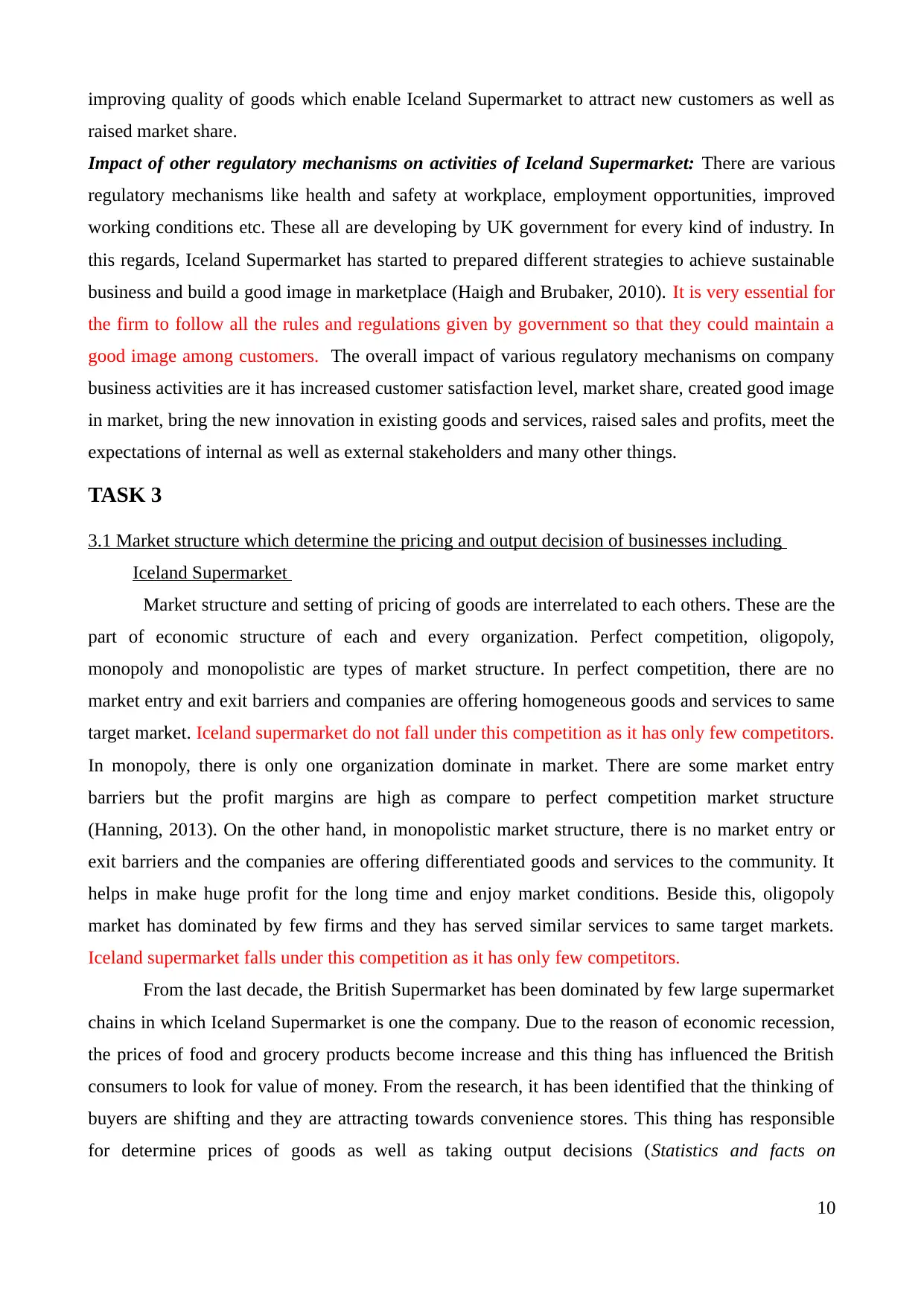
improving quality of goods which enable Iceland Supermarket to attract new customers as well as
raised market share.
Impact of other regulatory mechanisms on activities of Iceland Supermarket: There are various
regulatory mechanisms like health and safety at workplace, employment opportunities, improved
working conditions etc. These all are developing by UK government for every kind of industry. In
this regards, Iceland Supermarket has started to prepared different strategies to achieve sustainable
business and build a good image in marketplace (Haigh and Brubaker, 2010). It is very essential for
the firm to follow all the rules and regulations given by government so that they could maintain a
good image among customers. The overall impact of various regulatory mechanisms on company
business activities are it has increased customer satisfaction level, market share, created good image
in market, bring the new innovation in existing goods and services, raised sales and profits, meet the
expectations of internal as well as external stakeholders and many other things.
TASK 3
3.1 Market structure which determine the pricing and output decision of businesses including
Iceland Supermarket
Market structure and setting of pricing of goods are interrelated to each others. These are the
part of economic structure of each and every organization. Perfect competition, oligopoly,
monopoly and monopolistic are types of market structure. In perfect competition, there are no
market entry and exit barriers and companies are offering homogeneous goods and services to same
target market. Iceland supermarket do not fall under this competition as it has only few competitors.
In monopoly, there is only one organization dominate in market. There are some market entry
barriers but the profit margins are high as compare to perfect competition market structure
(Hanning, 2013). On the other hand, in monopolistic market structure, there is no market entry or
exit barriers and the companies are offering differentiated goods and services to the community. It
helps in make huge profit for the long time and enjoy market conditions. Beside this, oligopoly
market has dominated by few firms and they has served similar services to same target markets.
Iceland supermarket falls under this competition as it has only few competitors.
From the last decade, the British Supermarket has been dominated by few large supermarket
chains in which Iceland Supermarket is one the company. Due to the reason of economic recession,
the prices of food and grocery products become increase and this thing has influenced the British
consumers to look for value of money. From the research, it has been identified that the thinking of
buyers are shifting and they are attracting towards convenience stores. This thing has responsible
for determine prices of goods as well as taking output decisions (Statistics and facts on
10
raised market share.
Impact of other regulatory mechanisms on activities of Iceland Supermarket: There are various
regulatory mechanisms like health and safety at workplace, employment opportunities, improved
working conditions etc. These all are developing by UK government for every kind of industry. In
this regards, Iceland Supermarket has started to prepared different strategies to achieve sustainable
business and build a good image in marketplace (Haigh and Brubaker, 2010). It is very essential for
the firm to follow all the rules and regulations given by government so that they could maintain a
good image among customers. The overall impact of various regulatory mechanisms on company
business activities are it has increased customer satisfaction level, market share, created good image
in market, bring the new innovation in existing goods and services, raised sales and profits, meet the
expectations of internal as well as external stakeholders and many other things.
TASK 3
3.1 Market structure which determine the pricing and output decision of businesses including
Iceland Supermarket
Market structure and setting of pricing of goods are interrelated to each others. These are the
part of economic structure of each and every organization. Perfect competition, oligopoly,
monopoly and monopolistic are types of market structure. In perfect competition, there are no
market entry and exit barriers and companies are offering homogeneous goods and services to same
target market. Iceland supermarket do not fall under this competition as it has only few competitors.
In monopoly, there is only one organization dominate in market. There are some market entry
barriers but the profit margins are high as compare to perfect competition market structure
(Hanning, 2013). On the other hand, in monopolistic market structure, there is no market entry or
exit barriers and the companies are offering differentiated goods and services to the community. It
helps in make huge profit for the long time and enjoy market conditions. Beside this, oligopoly
market has dominated by few firms and they has served similar services to same target markets.
Iceland supermarket falls under this competition as it has only few competitors.
From the last decade, the British Supermarket has been dominated by few large supermarket
chains in which Iceland Supermarket is one the company. Due to the reason of economic recession,
the prices of food and grocery products become increase and this thing has influenced the British
consumers to look for value of money. From the research, it has been identified that the thinking of
buyers are shifting and they are attracting towards convenience stores. This thing has responsible
for determine prices of goods as well as taking output decisions (Statistics and facts on
10
Paraphrase This Document
Need a fresh take? Get an instant paraphrase of this document with our AI Paraphraser
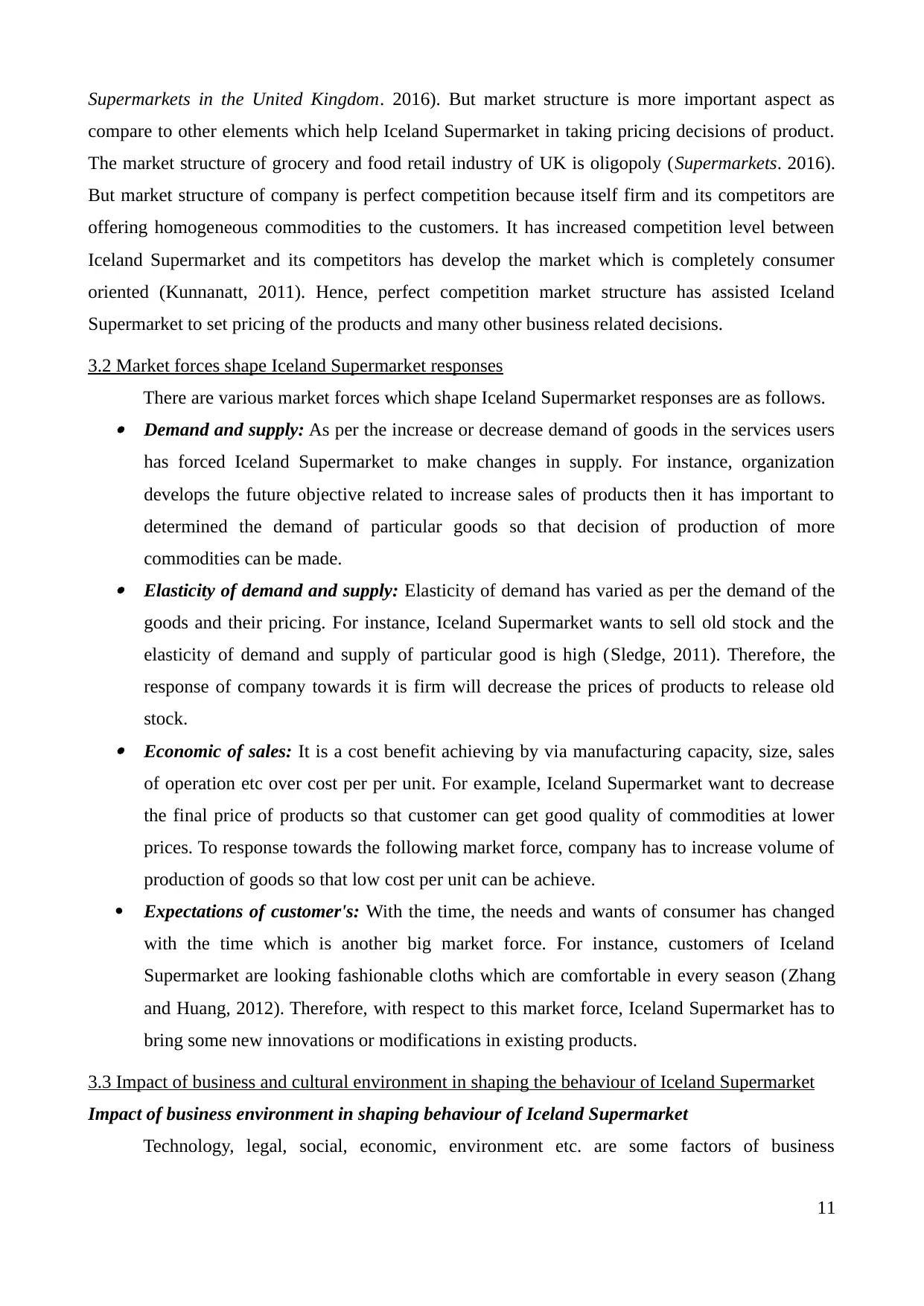
Supermarkets in the United Kingdom. 2016). But market structure is more important aspect as
compare to other elements which help Iceland Supermarket in taking pricing decisions of product.
The market structure of grocery and food retail industry of UK is oligopoly (Supermarkets. 2016).
But market structure of company is perfect competition because itself firm and its competitors are
offering homogeneous commodities to the customers. It has increased competition level between
Iceland Supermarket and its competitors has develop the market which is completely consumer
oriented (Kunnanatt, 2011). Hence, perfect competition market structure has assisted Iceland
Supermarket to set pricing of the products and many other business related decisions.
3.2 Market forces shape Iceland Supermarket responses
There are various market forces which shape Iceland Supermarket responses are as follows. Demand and supply: As per the increase or decrease demand of goods in the services users
has forced Iceland Supermarket to make changes in supply. For instance, organization
develops the future objective related to increase sales of products then it has important to
determined the demand of particular goods so that decision of production of more
commodities can be made. Elasticity of demand and supply: Elasticity of demand has varied as per the demand of the
goods and their pricing. For instance, Iceland Supermarket wants to sell old stock and the
elasticity of demand and supply of particular good is high (Sledge, 2011). Therefore, the
response of company towards it is firm will decrease the prices of products to release old
stock. Economic of sales: It is a cost benefit achieving by via manufacturing capacity, size, sales
of operation etc over cost per per unit. For example, Iceland Supermarket want to decrease
the final price of products so that customer can get good quality of commodities at lower
prices. To response towards the following market force, company has to increase volume of
production of goods so that low cost per unit can be achieve.
Expectations of customer's: With the time, the needs and wants of consumer has changed
with the time which is another big market force. For instance, customers of Iceland
Supermarket are looking fashionable cloths which are comfortable in every season (Zhang
and Huang, 2012). Therefore, with respect to this market force, Iceland Supermarket has to
bring some new innovations or modifications in existing products.
3.3 Impact of business and cultural environment in shaping the behaviour of Iceland Supermarket
Impact of business environment in shaping behaviour of Iceland Supermarket
Technology, legal, social, economic, environment etc. are some factors of business
11
compare to other elements which help Iceland Supermarket in taking pricing decisions of product.
The market structure of grocery and food retail industry of UK is oligopoly (Supermarkets. 2016).
But market structure of company is perfect competition because itself firm and its competitors are
offering homogeneous commodities to the customers. It has increased competition level between
Iceland Supermarket and its competitors has develop the market which is completely consumer
oriented (Kunnanatt, 2011). Hence, perfect competition market structure has assisted Iceland
Supermarket to set pricing of the products and many other business related decisions.
3.2 Market forces shape Iceland Supermarket responses
There are various market forces which shape Iceland Supermarket responses are as follows. Demand and supply: As per the increase or decrease demand of goods in the services users
has forced Iceland Supermarket to make changes in supply. For instance, organization
develops the future objective related to increase sales of products then it has important to
determined the demand of particular goods so that decision of production of more
commodities can be made. Elasticity of demand and supply: Elasticity of demand has varied as per the demand of the
goods and their pricing. For instance, Iceland Supermarket wants to sell old stock and the
elasticity of demand and supply of particular good is high (Sledge, 2011). Therefore, the
response of company towards it is firm will decrease the prices of products to release old
stock. Economic of sales: It is a cost benefit achieving by via manufacturing capacity, size, sales
of operation etc over cost per per unit. For example, Iceland Supermarket want to decrease
the final price of products so that customer can get good quality of commodities at lower
prices. To response towards the following market force, company has to increase volume of
production of goods so that low cost per unit can be achieve.
Expectations of customer's: With the time, the needs and wants of consumer has changed
with the time which is another big market force. For instance, customers of Iceland
Supermarket are looking fashionable cloths which are comfortable in every season (Zhang
and Huang, 2012). Therefore, with respect to this market force, Iceland Supermarket has to
bring some new innovations or modifications in existing products.
3.3 Impact of business and cultural environment in shaping the behaviour of Iceland Supermarket
Impact of business environment in shaping behaviour of Iceland Supermarket
Technology, legal, social, economic, environment etc. are some factors of business
11
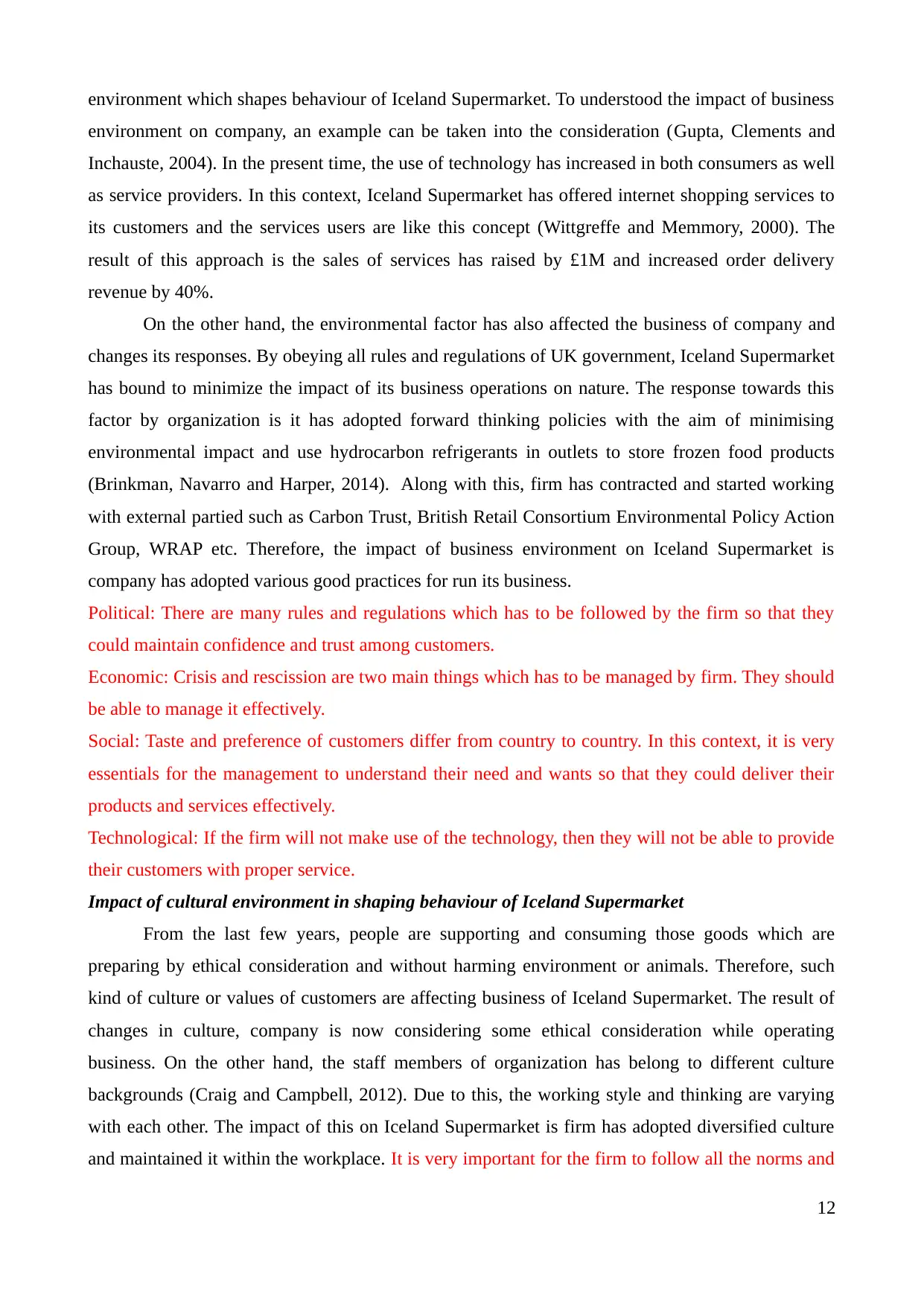
environment which shapes behaviour of Iceland Supermarket. To understood the impact of business
environment on company, an example can be taken into the consideration (Gupta, Clements and
Inchauste, 2004). In the present time, the use of technology has increased in both consumers as well
as service providers. In this context, Iceland Supermarket has offered internet shopping services to
its customers and the services users are like this concept (Wittgreffe and Memmory, 2000). The
result of this approach is the sales of services has raised by £1M and increased order delivery
revenue by 40%.
On the other hand, the environmental factor has also affected the business of company and
changes its responses. By obeying all rules and regulations of UK government, Iceland Supermarket
has bound to minimize the impact of its business operations on nature. The response towards this
factor by organization is it has adopted forward thinking policies with the aim of minimising
environmental impact and use hydrocarbon refrigerants in outlets to store frozen food products
(Brinkman, Navarro and Harper, 2014). Along with this, firm has contracted and started working
with external partied such as Carbon Trust, British Retail Consortium Environmental Policy Action
Group, WRAP etc. Therefore, the impact of business environment on Iceland Supermarket is
company has adopted various good practices for run its business.
Political: There are many rules and regulations which has to be followed by the firm so that they
could maintain confidence and trust among customers.
Economic: Crisis and rescission are two main things which has to be managed by firm. They should
be able to manage it effectively.
Social: Taste and preference of customers differ from country to country. In this context, it is very
essentials for the management to understand their need and wants so that they could deliver their
products and services effectively.
Technological: If the firm will not make use of the technology, then they will not be able to provide
their customers with proper service.
Impact of cultural environment in shaping behaviour of Iceland Supermarket
From the last few years, people are supporting and consuming those goods which are
preparing by ethical consideration and without harming environment or animals. Therefore, such
kind of culture or values of customers are affecting business of Iceland Supermarket. The result of
changes in culture, company is now considering some ethical consideration while operating
business. On the other hand, the staff members of organization has belong to different culture
backgrounds (Craig and Campbell, 2012). Due to this, the working style and thinking are varying
with each other. The impact of this on Iceland Supermarket is firm has adopted diversified culture
and maintained it within the workplace. It is very important for the firm to follow all the norms and
12
environment on company, an example can be taken into the consideration (Gupta, Clements and
Inchauste, 2004). In the present time, the use of technology has increased in both consumers as well
as service providers. In this context, Iceland Supermarket has offered internet shopping services to
its customers and the services users are like this concept (Wittgreffe and Memmory, 2000). The
result of this approach is the sales of services has raised by £1M and increased order delivery
revenue by 40%.
On the other hand, the environmental factor has also affected the business of company and
changes its responses. By obeying all rules and regulations of UK government, Iceland Supermarket
has bound to minimize the impact of its business operations on nature. The response towards this
factor by organization is it has adopted forward thinking policies with the aim of minimising
environmental impact and use hydrocarbon refrigerants in outlets to store frozen food products
(Brinkman, Navarro and Harper, 2014). Along with this, firm has contracted and started working
with external partied such as Carbon Trust, British Retail Consortium Environmental Policy Action
Group, WRAP etc. Therefore, the impact of business environment on Iceland Supermarket is
company has adopted various good practices for run its business.
Political: There are many rules and regulations which has to be followed by the firm so that they
could maintain confidence and trust among customers.
Economic: Crisis and rescission are two main things which has to be managed by firm. They should
be able to manage it effectively.
Social: Taste and preference of customers differ from country to country. In this context, it is very
essentials for the management to understand their need and wants so that they could deliver their
products and services effectively.
Technological: If the firm will not make use of the technology, then they will not be able to provide
their customers with proper service.
Impact of cultural environment in shaping behaviour of Iceland Supermarket
From the last few years, people are supporting and consuming those goods which are
preparing by ethical consideration and without harming environment or animals. Therefore, such
kind of culture or values of customers are affecting business of Iceland Supermarket. The result of
changes in culture, company is now considering some ethical consideration while operating
business. On the other hand, the staff members of organization has belong to different culture
backgrounds (Craig and Campbell, 2012). Due to this, the working style and thinking are varying
with each other. The impact of this on Iceland Supermarket is firm has adopted diversified culture
and maintained it within the workplace. It is very important for the firm to follow all the norms and
12
⊘ This is a preview!⊘
Do you want full access?
Subscribe today to unlock all pages.

Trusted by 1+ million students worldwide
1 out of 19
Related Documents
Your All-in-One AI-Powered Toolkit for Academic Success.
+13062052269
info@desklib.com
Available 24*7 on WhatsApp / Email
![[object Object]](/_next/static/media/star-bottom.7253800d.svg)
Unlock your academic potential
Copyright © 2020–2025 A2Z Services. All Rights Reserved. Developed and managed by ZUCOL.





